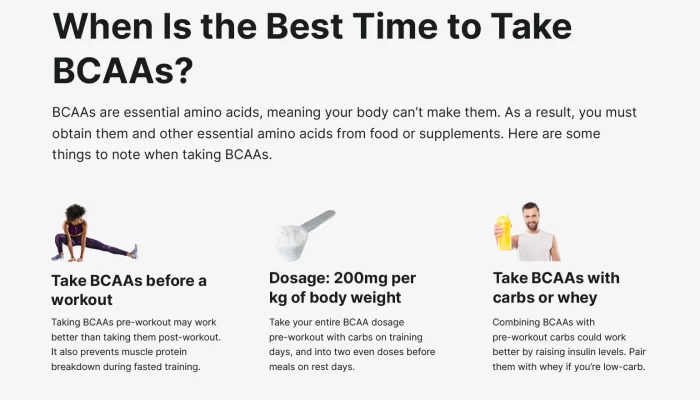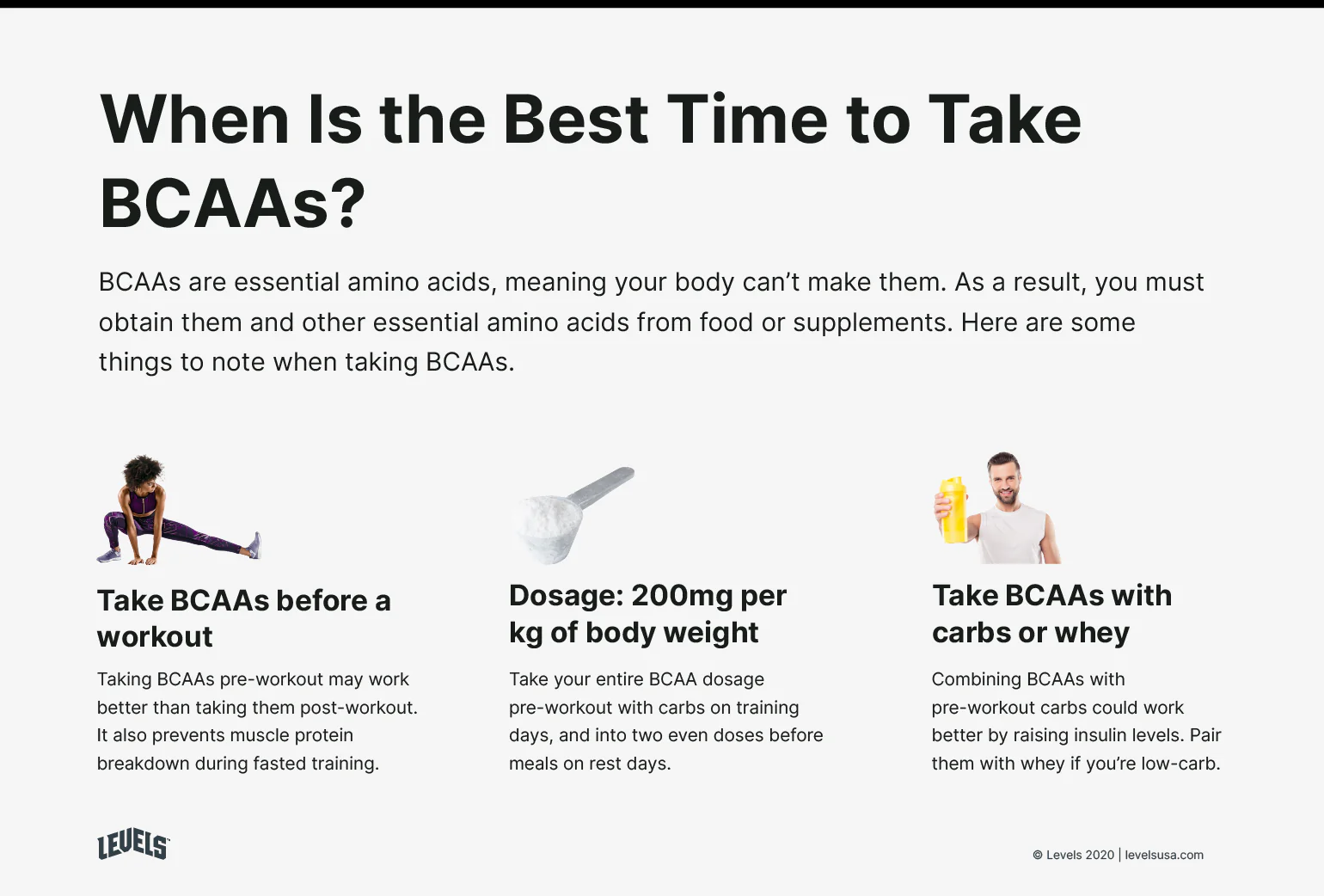
Branched-Chain Amino Acids (BCAAs) have become a popular supplement among fitness enthusiasts and athletes for their purported benefits in muscle support and growth. Understanding the optimal timing for BCAA intake can enhance their effectiveness and contribute to your overall fitness goals. This article explores when and how to take BCAAs to maximize their benefits for muscle growth.
What are BCAA Supplements?
BCAA supplements consist of three essential amino acids: leucine, isoleucine, and valine. Unlike other amino acids, BCAAs are metabolized directly in the muscle rather than the liver. This unique pathway helps BCAAs play a crucial role in muscle protein synthesis and energy production during exercise. As such, BCAAs are often used to support muscle recovery and growth.
How BCAA Supplements May Help Your Fitness Regimen
Integrating BCAA supplements into your fitness routine can offer several benefits:
- Muscle Support Post-Workout: BCAAs can help reduce muscle soreness and promote faster recovery after intense workouts. By minimizing muscle breakdown, they support the repair and growth of muscle tissues.
- Improved Exercise Performance: BCAAs may reduce fatigue during workouts, allowing you to train harder and longer. This can lead to better overall performance and results.
- Enhanced Muscle Growth: Consuming BCAAs around your workouts can stimulate muscle protein synthesis, which is essential for muscle growth and repair.
Science-Based Evidence for When to Take BCAA Supplements
Understanding the best times to take BCAA supplements can optimize their benefits. Here’s what current research suggests:
Before or After Exercise
One of the most common questions about BCAAs is whether to take them before or after exercise. Research indicates that both timing strategies can be effective, depending on your specific goals:
- Before Exercise: Taking BCAAs before your workout may help reduce muscle fatigue and improve exercise performance. This can be particularly beneficial if you’re engaging in high-intensity or prolonged exercise sessions.
- After Exercise: Consuming BCAAs post-workout can help enhance muscle recovery and growth. This timing supports muscle repair and replenishes amino acid levels depleted during exercise, promoting faster recovery.
Window of Time to Take BCAAs
The optimal window for BCAA consumption is a topic of ongoing research. Generally, it’s beneficial to consume BCAAs within a 30-minute to 2-hour window before or after your workout. This ensures that your muscles have the necessary amino acids available when they are most needed.
During Exercise
Taking BCAAs during exercise can be advantageous for endurance and performance. Sipping on a BCAA drink during your workout may help maintain amino acid levels and reduce muscle breakdown, especially during prolonged or intense exercise sessions.
Other Factors That May Enhance BCAA Effectiveness
To maximize the benefits of BCAA supplements, consider these additional factors:
- Overall Diet: Ensure your diet is well-balanced and includes adequate protein intake. BCAAs work best when they are part of a comprehensive nutritional strategy that supports your fitness goals.
- Hydration: Staying well-hydrated is crucial for optimal muscle function and recovery. Proper hydration can enhance the effectiveness of BCAA supplements and overall exercise performance.
- Exercise Regimen: Tailor your BCAA intake to your specific workout routine. For example, if you engage in high-intensity training or are involved in strength training, your BCAA needs might differ from those of someone doing moderate cardio.
- Sleep and Recovery: Adequate sleep and recovery time are essential for muscle growth and repair. BCAAs should complement, not replace, a well-rounded approach to recovery.
The Bottom Line
Determining the best time to take BCAA supplements depends on your individual fitness goals and training regimen. Consuming BCAAs before or after your workout can support muscle growth and recovery. For those seeking optimal performance and endurance, taking BCAAs during exercise may also be beneficial.
Integrating BCAAs into your fitness routine, alongside a balanced diet and proper recovery practices, can help you achieve your muscle growth and performance goals. Remember, the most effective approach is one that aligns with your personal needs and preferences.
This version focuses on the relevant keywords in the order of importance, providing a comprehensive overview of when and how to take BCAAs to support muscle growth.
Detailed Guidelines for BCAA Intake
To maximize the benefits of BCAA supplements, following these detailed guidelines can help you tailor your intake to your specific needs and goals.
How Much BCAA Should I Take to Build Muscle?
Determining the right dosage of BCAA supplements is crucial for achieving optimal muscle support and growth. While individual needs may vary, general recommendations suggest:
- Typical Dosage: A common dosage range is 5-10 grams of BCAAs per serving. This amount can help stimulate muscle protein synthesis and support recovery.
- Frequency: Depending on your workout intensity and goals, you might take BCAAs 1-3 times daily. For example, consuming a dose before and after workouts can be particularly effective.
- Personalization: It’s important to adjust the dosage based on your body weight, exercise intensity, and overall protein intake. Consult with a healthcare provider or nutritionist to determine the best dosage for your specific needs.
Best Time to Take BCAAs for Muscle Growth
To optimize muscle growth, timing BCAA intake can be crucial:
- Pre-Workout: Taking BCAAs 30 minutes to an hour before exercise can help enhance performance and reduce muscle breakdown during your workout. This timing ensures that your muscles are supplied with essential amino acids right when they need them most.
- Post-Workout: Consuming BCAAs immediately after exercise helps replenish amino acid levels and supports muscle recovery. This timing can be especially beneficial after intense workouts that deplete your amino acid reserves.
- Throughout the Day: For continuous muscle support, consider spreading your BCAA intake throughout the day, especially if you’re training multiple times or have long periods between meals.
When to Take Amino Acids for Muscle Growth
Amino acids, including BCAAs, play a vital role in muscle growth and repair. The timing of amino acid intake can further enhance these effects:
- Before Meals: Taking amino acids before meals can help ensure that your body has the necessary building blocks for muscle protein synthesis. This can be particularly useful if you’re on a calorie-restricted diet.
- Before Bed: Consuming amino acids before bedtime may support overnight muscle repair and growth. This is particularly beneficial if you have long periods without food or are aiming to maximize muscle recovery during sleep.
Additional Considerations
While BCAAs are beneficial, it’s essential to consider a holistic approach to your fitness and nutrition:
- Balanced Nutrition: Ensure that your overall diet provides sufficient protein and essential nutrients. BCAAs should complement a well-rounded nutritional plan, not replace it.
- Quality of Supplement: Choose high-quality BCAA supplements with minimal additives and fillers. Look for products with a proven track record and good manufacturing practices.
- Consistency: For the best results, maintain consistent BCAA supplementation as part of your regular routine. This consistency, combined with a proper exercise regimen, can lead to improved muscle growth and recovery.
Conclusion
Taking BCAA supplements at the right time can significantly impact your muscle growth and overall fitness results. Whether you choose to take them before, after, or during your workouts, understanding the optimal timing and dosage can help you achieve your goals more effectively. Remember, integrating BCAAs into a balanced diet and exercise routine is key to maximizing their benefits and supporting your muscle development journey.
By following these guidelines and tailoring your BCAA intake to your personal needs, you can enhance your performance, accelerate recovery, and support your muscle growth goals.
This continuation completes the article with detailed guidelines on dosage, timing, and additional considerations to help you make the most of your BCAA supplements. If you need any further adjustments or additional information, feel free to ask!
If you have any questions for us, you can see more at: heathcarenow, Youtube, Twitter(X),…
See more of our other articles: What is Jaw Pain ?, Catabolism vs. Anabolism: What’s the Difference?, Tennis Ball Massage for Myofascial Trigger Points





